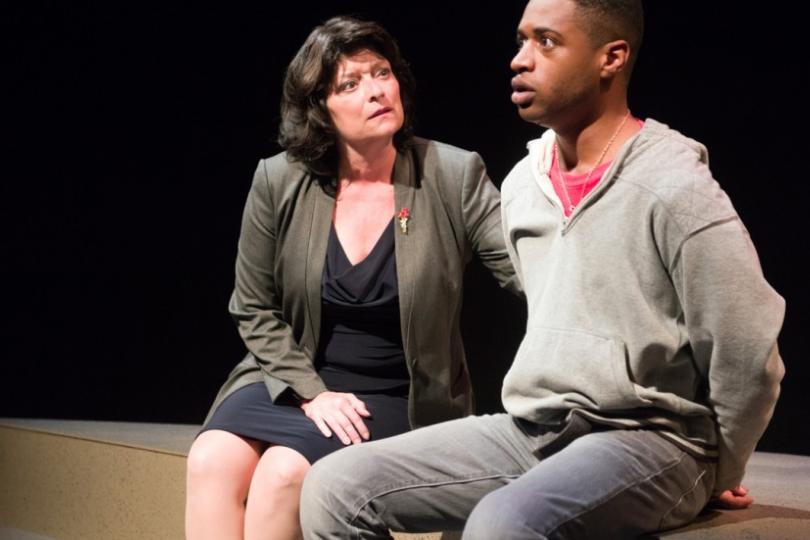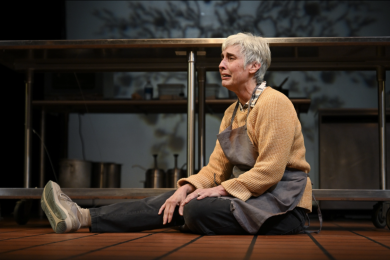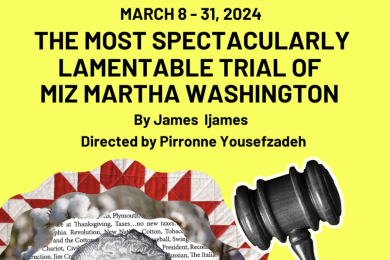Best of 2015-16: Prep and We Gotta Cheer Up Gary

I saw a lot of great theater this year – theater that explored issues around race, religion, and sexual orientation, theater that pushed audiences to surreal and challenging places, and theater that used an unusual setting to create a disarming sense of intimacy with the audience. Companies around the Twin Cities are stepping up their game when it comes to being willing to address their audiences directly about our most burning cultural questions, and it is exciting to see audiences respond so eagerly to the kinds of dialogue these plays provoke.
But as excellent as they were, the danger in some of this past season’s two-act plays is that the longer they are, the more room they have for error. So when thinking about the theater that stood out most for me this past year, it was the shorter plays that packed the most punch. For my “Best Of,” here are two plays that, in under 90 minutes, encapsulated an idea just about as perfectly as you can get.
Political and unconventional
If you know my aesthetic, my first pick won’t be a surprise. I am drawn to theater with a political or social justice slant, I like characters that are flawed and three-dimensional, and I get excited by new plays that approach their subject matter in unconventional ways. But it is uncommon to see new work that achieves all three of these goals as well as Tracey Scott Wilson’s Prep, which appeared at Pillsbury House Theatre last September.
Prep dealt with racial tension in the educational system, and it was based on the real experiences of children and adults in Minneapolis, but it was no documentary. Wilson’s script crossed back and forth between natural speech and rap, and her cast – Kory LaQuess Pullam, Ryan Colbert, and Jodi Kellogg – made full use of her poetic language to bring out both the specificity of each character and the universality of their struggles.
The set was very spare, which let the audience focus entirely on the complicated dynamics unfolding between the characters. Although equal access to education is clearly a common goal for all three of them, they each experience different roadblocks – some more visible and more violent than others.
On top of the performances, which were beautiful, the length of the play went a long way towards making the production so effective. Wilson develops the complexity of the characters’ aspirations and the social pressures that each one must navigate, but doesn’t let the audience rest comfortably in a cathartic second-act denouement. One act was just the right amount of time to humanize the problem without reducing it to an easy solution.
Just this good
My second pick for “Best Of” makes me feel a little guilty, because it deals with none of the greater social concerns of any of the plays I’ve mentioned above. But when a show is this well done, it deserves a mention, and We Gotta Cheer Up Gary was just that good.
This was a one-act show by the Four Humors that ostensibly was just about making everyone happy. And it totally did: the Cheerology team of Jason Ballweber, Ryan Lear, and Mike Fotis, under the irrational management of Dario Tangelson, bust out every trick in the book to make the audience laugh. It was a treat to watch these masters of jokes, prop comedy, and pratfalls at the top of their game. (It also made me think that all my skepticism about silly comedy was really due to the fact that so much of it is so inferior to what these guys are doing.)
They also set the tone for their show from the very beginning, with Tangelson greeting guests with nametags as we took our seats (everyone was named Gary to facilitate introductions). And the seating arrangement itself, which was behind the backstage curtain, turned the Southern Theater into a surprisingly intimate space – a comedy club, but where the entire audience is also party to all the backstage shenanigans.
But again, on top of the excellent performances, the show’s length gave it just enough room to go deeper than its comedic fluff would initially suggest. Behind all the gags was a pretty sharply-aimed satire of our culture of cheerfulness where, amidst crumbling home lives and a mess of bureaucratic red tape, we are expected to put on a happy face and assure each other that everything is just fine. Longer than one act and this heavy premise would weigh us down, but an hour or so was exactly the right dose of sadness to balance out the clowning.
Needing a new summary phrase
We have a lot of ways to talk about short things: short and to the point, short and sweet. Both of those expressions imply that short means simple, direct, and easy to digest. But that’s just not true for Prep and Gary, which were anything but trite. If they had been any longer, Prep would have risked oversimplifying a complex situation, and Gary would have diluted its comedy. Both plays captured something with their brevity that would have gotten lost in a longer show. What’s the expression for “short” that encompasses all that?




